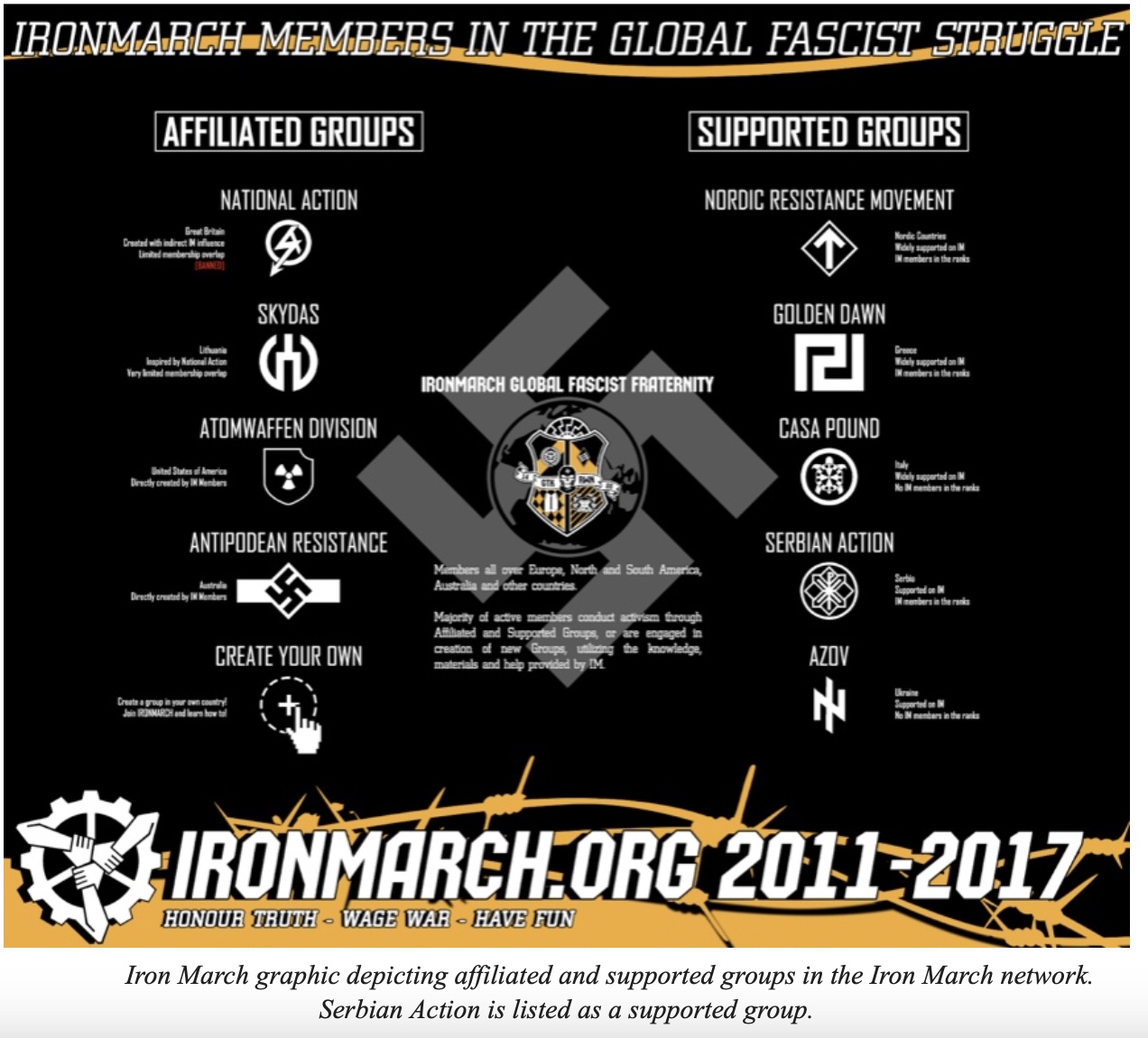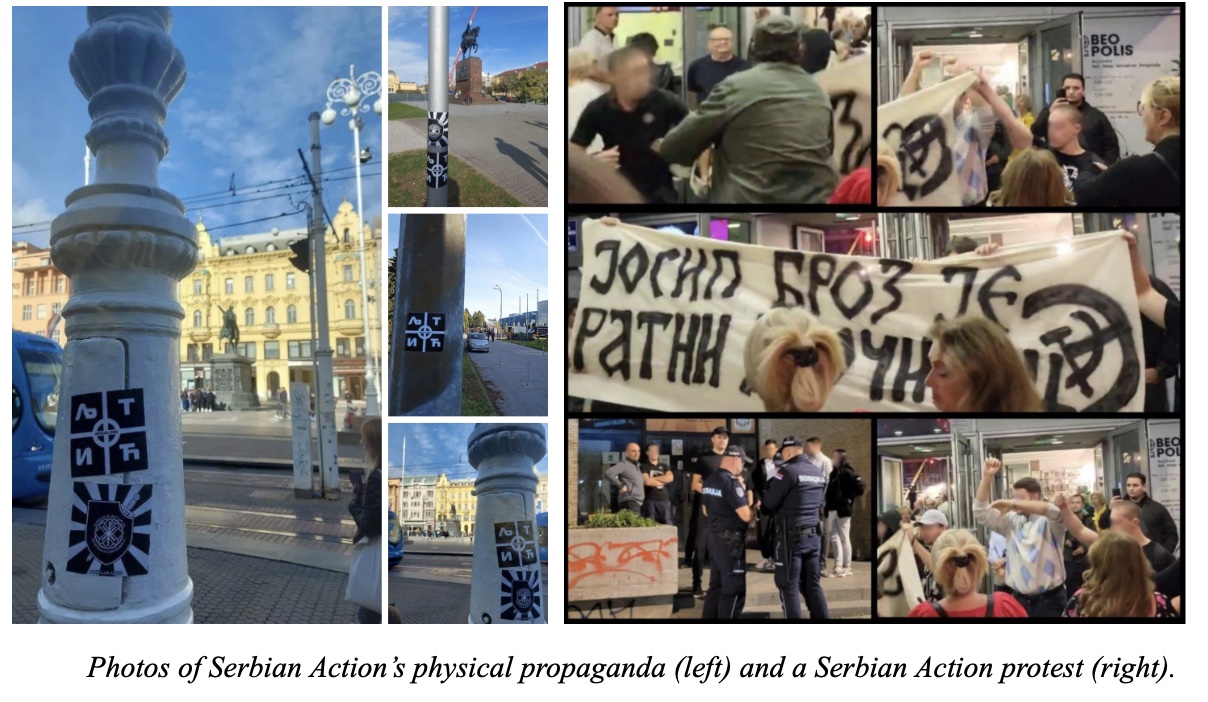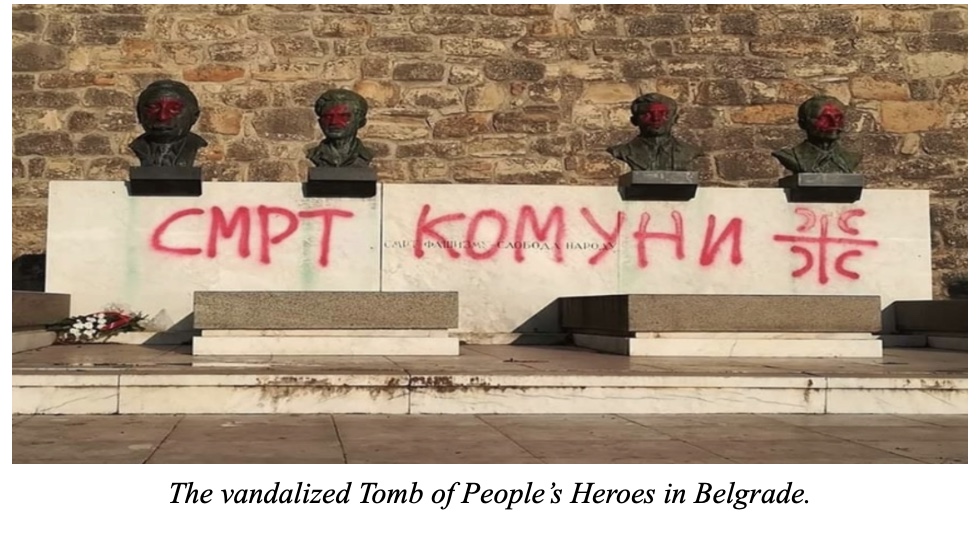Dangerous Organizations and Bad Actors: Serbian Action
| by CTEC
Introduction
Serbian Action is an organization predicated upon Serbian and Orthodox Christian nationalisms imbued with a distinctly clerical fascist and accelerationist orientation. Established in 2010 by a lawyer and alum of the University of Belgrade Faculty of Law, the organization’s goals are threefold: to restore Serbia’s Orthodox faith and monarchy; to ensure the survival of the Serbian people and culture in the face of perceived persecution by modern societal values; and to establish Serbia as a country free of immigrants, multiculturalism, and Western influence. Although Serbian Action does not openly engage in or advocate the use of violence in achieving these goals, violence is sometimes justified as a means of “self defense” against out-groups perceived to represent antithetical social forces. The organization’s affiliation and collaboration with extremist organizations such as Russian Imperial Movement (RIM) and Greece’s Golden Dawn reinforces these narratives and provides it with increased transnational exposure. Serbian Action maintains a consistent support base both online and in person, though said support appears to be largely based in Serbia. The organization’s propaganda and political platform reflect a risk of radicalization toward a militant accelerationist worldview via its explicit endorsement of influential neofascist philosophers and organizations.
Ideology
Serbian Action’s ideological adherences are presented through the lens of an ultranationalist, Serbian Orthodox perspective. Most commonly, the organization references these ideological foundations via a conveyed emphasis on the preservation and survival of the Orthodox Christian, ethnically Serbian people, whose existence is perceived to be threatened by multiculturalism, immigration, secularism, depopulation, and the “New Age”—a reference to modern society and its liberal values, thus aligning itself with other neofascist accelerationist groups and organizations against modernity. Serbian Action asserts that it adheres to Third Position beliefs, indicating an organizational tendency toward neofascist ideological leanings, grounded within a distinctly clerical outlook. In further testament to its neofascist adherence, the organization is largely influenced by Dimitrije Ljotić, a fascist World War II-era politician who sympathized with Germany and wrote extensively of the perceived evils of Jews and Judaism. Accordingly, an antisemitic worldview, alongside narratives alleging global Jewish control and a nefarious agenda involving cultural indoctrination, the targeting of children, and the destruction of traditional values, are upheld within Serbian Action. Such narratives are discussed both within a religious context, bolstered by religious verses, as well as via quotations from influential antisemitic figures and allegations from the organization itself.
Serbian Action also adheres to accelerationist principles, unified by the belief that the modern world, alternatively referred to as “the System,” poses a threat to the survival of the Serbian people that can only be triumphed by their own spiritual “awakening”—a concept often intertwined with implicit advocations for violence as a means of self-defense against perceived upholders of “the System.” Though not promoting to its members and supporters the idea of being the aggressor of violent acts, Serbian Action justifies the use of physical violence as a means of defending against religious and political rivals, as these out-groups are perceived as contributing to Serbia’s religious, cultural, and physical degeneration. Violence is often discussed within a “warrior” framework, wherein members and sympathizers seek a warrior ideal for themselves (and Serbs more generally) via the embrace of spiritual and physical preparation for war as a means of spiritual ascension. The achievement of this warrior ideal is referenced within Serbian Action as a necessary procurement for Serbian survival. Due to its Serbian Orthodox foundations, the warrior ideal is typically discussed within the organization through a religious, spiritual framework.
Serbian Action’s strong emphasis on the concepts of spiritual ascension and the embodiment of a warrior ideal are reflective of the organization’s adherence to Traditionalism, and particularly the fascist strain popularized by far-right Italian philosopher Julius Evola, who held ties to Nazi Germany. Evola created the concept of “traditionalist fascism,” which blended spiritual and physical justifications for war in order to achieve a racially pure, divine society. Evola believed time to be cyclical, moving from the Golden Age (the height of divine royalty) to the Silver Age (the height of the warrior caste) to the Bronze Age (the height of the merchant caste, and the age he believed he was living in) to the Iron Age (the height of the working class, and, in his view, the worst possible outcome). Through the use of violence and war to achieve a higher spiritual goal (for example, eradicating Jewish influence and halting the rise of progressivism to allow the Aryan race to prevail), Evola imagined that the timeline could be reversed to return to the Golden Age. When Hitler and the Nazi Party failed to achieve their ultimate goals, Evola changed his perspective and instead asserted that society needed to “accelerate” past the dark age in order to reach the beginning of the time cycle, or a new Golden Age, thus creating the foundation for contemporary militant accelerationism.
Serbian Action frequently references Evola in online uploads, particularly via imagery of his likeness accompanied by one of his quotations, as well as references to his literary works. The appearance of Evola’s quotes and philosophy within Serbian Action’s online communications indicate that the organization is embracing an accelerationist agenda to achieve its goals of restoring the Orthodox monarchy, creating a racially pure society, and banishing all Western and European influence within Serbia. Notably, however, references to Evola and Traditionalist ideals within the organization’s communications have fallen short of mobilizing members and sympathizers to take action in pursuit of these goals.
Membership
Within Serbian Action, significant emphasis is placed on obscuring members’ names and physical appearances—a priority that extends to the organization’s leadership as well. Very little is known about the founder of Serbian Action, other than that he is a lawyer who is said to provide Serbian Action members with advice on avoiding criminal prosecution under Serbian law (and thus, keeping their identities hidden from the public). Additionally, members’ faces are often blurred within Serbian Action-affiliated photo and video content, further indicating a desire for anonymity among members.
The organization’s prioritization of anonymity complicates accurate estimates of membership. In 2014, it was estimated that Serbian Action had around 20 active members and approximately 50 sympathizers; at that time, the majority of members were assessed to be law and philosophy students from Belgrade aged 20 to 32. However, based on photos and videos associated with more recent organizational activity, it is likely that membership has increased since that time. At the time of publishing, accurate estimations of membership are unavailable.
Requirements for membership within Serbian Action include a strong devotion to the Orthodox Christian church and a desire for Serbia’s leadership to be toppled and replaced by an Orthodox monarchy. Ideological similarities, including a shared hatred of Romanis in Serbia, immigrants, and the LGBTQ+ community, are also preferred. Serbian Action allows both male and female membership.
Affiliations
Within the past year, Serbian Action has begun documenting its friendly relations with the Russian Imperial Movement (RIM), a group that has been sanctioned by the United States and Canada and has been designated as a terrorist group pursuant to their respective legal authorities. The organization has posted videos on social media of its members physically traveling to St. Petersburg to interview RIM leaders (Stanislav Anatolyevich Vorobyev and Denis Valiullovich Gariev, each also individually designated as SDGTs) and receive a tour of the RIM training facilities. In one of the videos, Gariev invites members of Serbian Action to Join the Russian Imperial Legion (the paramilitary branch of RIM). RIM is well-known for its paramilitary courses that have trained international terrorist groups in the past, but it is presently unknown whether Serbian Action participated in a full training program or visited to express support. Additionally, Serbian Action has posted content indicating nonviolent collaborative activity, such as attendance of prayer services and processions, between itself and the Imperial Legion. Serbian Action and RIM are ideologically aligned along accelerationist, ultranationalist, and religious points.
Despite only recently documenting this relationship, Serbian Action members have been identified alongside RIM members for years. In May of 2018, a gathering hosted by Germany’s youth organization Young Nationalists included guests from RIM as well as Serbian Action.
Additionally, Serbian Action frequently collaborates with Casus Belli, based in Romania. Online posts indicate recurrent communication and activity between Serbian Action and Casus Belli, with indicators including online interaction with and reposting of each others’ uploads, gifts exchanged between organizations, and in-person, days-long collaborative activity such as inter-organizational hikes. Casus Belli appears to be a part of a larger Romanian nationalist network, and it is possible that Serbian Action has similarly interacted with other nodes within this network. Notably, Casus Belli shares many ideological points of alignment with Serbian Action, including an emphasis on nationalism, pro-Orthodoxy, anti-migrant and anti-LGBTQ+ sentiments, and a very likely accelerationist worldview.
Serbian Action has historically maintained relationships with accelerationist organizations associated with the now-defunct, militant accelerationist Iron March forum. Iron March, active from 2011-2017, listed Serbian Action as one of its “Supported Groups,” indicating an overlap between the organization and the broader Iron March network. Additionally, Iron March claimed to have its own members within the ranks of Serbian Action (see image below). Among the “Affiliated” and “Supported” groups of Iron March are several other militant accelerationist organizations that share similar goals and perspectives:

Most notably, Serbian Action previously maintained a strong relationship with the neo-Nazi political party and ultranationalist criminal organization The Popular Association–Golden Dawn (most commonly: Golden Dawn) in Greece. Golden Dawn is listed as a “Supported Group” of the Iron March web forum, demonstrating the strength of connections and ideological similarities between organizations affiliated with the Iron March network. From 2013-2015, Serbian Action publicly supported Golden Dawn’s actions and objectives via online posts, propaganda, and a physical presence at events such as marches. In one instance, Serbian Action posted a congratulatory message on its website to Golden Dawn for receiving 7% of the popular vote (just under 400,000 votes) in the Greek election in 2015. It is unclear whether the two organizations are presently affiliated.
Finally, on a local level, Serbian Action collaborates with like-minded organizations including Generation Identity, another far-right extremist group with a Serbian presence, to march, protest, demonstrate, and proliferate its ideology. In January of 2018, Serbian Action held a joint demonstration with Generation Identity in front of St. Sava Church in Belgrade, the largest Serbian Orthodox church in Serbia. The two organizations also share an anti-NATO worldview, with Generation Identity carrying out its own anti-NATO protest in March of 2018.
Propaganda
Online, Serbian Action disseminates its propaganda on three main platforms: its official Telegram channel, its official website, and its blog. Of these platforms, the Telegram platform appears to function as a central hub for the organization, with near-daily uploads promoting the organization and crafting ideological appeals to Orthodox, nationalist, and anti-System worldviews. Nationalist propaganda is a core theme across the Telegram channel, occurring through both a religious lens as well as through a historical one. Uploads often feature quotations from various Orthodox saints and influential religious figures which justify a nationalist worldview, in some instances through the justification of violence. Other posts celebrate Serbian independence and discuss historical events that are symbolic of Serbian triumph over various enemies. Also commonly featured are references to the degeneracy of the modern world and the necessity to rebel against it through the restoration and defense of “true values” as well as the cultivation of “psychophysical strength” and readiness. Evola is often referenced in such contexts. Notably, Serbian Action’s official website and blog reflect these themes very closely, though typically in much longer form, such as essays, and also reiterate their support of the Russian Imperial Movement more frequently.
Serbian Action also prioritizes the dissemination of physical propaganda, with members and sympathizers engaging in stickering activity and distributing books and other paraphernalia featuring its logo. Additionally, Serbian Action adherents attend public protests and demonstrations on topics including religious justifications for nationalist ideals, honoring historical martyrs and “heroes,” anti-NATO, anti-Kosovo, and anti-Western influence, and anti-LGBTQ+ sentiment. Other public events, including the unveiling of created murals and distribution of humanitarian aid (e.g., donating clothes) are also created and attended. Attendance of these events appears to be a core feature of in-person activity for the organization, also representing one of the predominant ways members and sympathizers congregate on a local level. Such events likely serve to bolster an in-group identity and portray out-groups as an existential threat. Further, footage and photos of these events, as well as pictures of physical propaganda such as stickers placed on public structures, are uploaded to Serbian Action’s website, mainstream social media platforms, and Telegram channel. The online documentation of physical or in-person propaganda is a known feature of other accelerationist organizations’ online propaganda and is likely done as a means of further encouraging members and adherents to engage in public support for the organization.

Arrests/Plots/Attacks
Members and sympathizers of Serbian Action appear to largely refrain from engagement in criminal activity, with only two noteworthy instances warranting an appearance within news networks. Further, the criminal activity carried out is nonviolent, instead emphasizing the proliferation of hateful rhetoric and the defacement of historic structures. While a reason for this is not given, the organization’s lack of widespread criminal activity may indicate a lack of emphasis on physical violence as a central component of its ideology, within its propaganda, or as a condition of membership. Additionally, members’ avoidance of engagement with violent activity except as self-defense may be further evidence of the organization’s strong counsel provided by its founder.
In 2014, Serbian Action distributed flyers about illegal Romani settlements that encouraged lynching of its occupants. One member of the group (identified only as F.G., age 24) was arrested for the crime and detained for inciting national, racial, and religious hatred and intolerance. Police confiscated the suspect’s laptop, mobile phone, and a USB, which appeared to be used to assist the group with this particular hate crime. This event drew Serbian Action (at the time considered only a “social group”) more clearly into the public eye and police’s radar.
On December 8th, 2019, Serbian Action vandalized the Tomb of People’s Heroes in Belgrade with red paint across the busts’ eyes and the words “death to Communists” across the front of the tomb. Although the defacement was condemned by the New Communist Party of Yugoslavia, it does not appear to have resulted in punishment for any members of Serbian Action.

Conclusion
Serbian Action adopts a more cautious stance on violence compared to other accelerationist groups, which openly embrace it as a core principle. Nevertheless, the organization still promotes the violent ideologies of neofascism, militant accelerationism, and Traditionalism, all of which are known to incite terrorism and extremist violence. Serbian Action’s ties to violent organizations like the Russian Imperial Movement (RIM) cement its status as a prominent extremist entity in Serbia, serving as a potential conduit for radicalization within Serbian politics and connecting to transnational extremist networks. The group also plays a key role in facilitating meetings, spreading propaganda, and recruiting for more militant accelerationist groups. Its continued networking with organizations like Golden Dawn, another Iron March participant, highlights Serbian Action’s ongoing involvement in far-right transnational collaboration, continuing the legacy of Iron March’s extremist influence.
